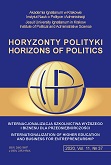Imperium wiedzy interesownej (impresja o dokonywaniu się pewnych procesów w skali globalnej)
Mercenary Knowledge Empire (An Impression about Certain Processes Taking Place on the Global Scale)
Author(s): Paweł ArmadaSubject(s): Politics, Media studies, Communication studies, Welfare systems, Health and medicine and law
Published by: Uniwersytet Ignatianum w Krakowie
Keywords: 2020 coronavirus pandemic; experts; media democracy; leadership; New Humanist Movement;
Summary/Abstract: RESEARCH OBJECTIVE: The aim is to draw scholars’ attention to special cognitive merits of the situation that derives from (the common perception of) the global epidemic threat. THE RESEARCH PROBLEM AND METHODS: The problem consists in bringing to light of the distance between the elite of experts – who either exert influence on actions taken by the decision makers or become used by the latter in order to justify their decisions – and the general public living under conditions of the so called “media democracy” which mean, at it seems, the gradual predominance of the irrational attitude as well as distrust of the science. To study this process – one that probably indicates the key aspect of parting ways between the practice of democracy and the theory of modern state – requires not only some observation and analysis of the media coverage but also a careful reflection on some cases of the diagnosis of modernity, insofar as they had anticipated the present day situation. And this may be the case of a couple of American thinkers from the 1. half of the 20th century. THE PROCESS OF ARGUMENTATION: “The article begins with some notes on the actual media coverage of experts talking about the “ fight against coronavirus,” and then we confront some useful generalizations about the role of mass media and educated elites. In the course of the argument there are references to passages providing examples of the diagnosis of the modern state and society by Saul Bellow, Christopher Lasch, Water Lippmann, Robert Shafer, Paul Elmer More, and George Santayana. In the third part of the essay we return, in a mode, to the previous generalizations, while putting stress on a peculiarity of Polish experience (that should, nevertheless, turn out to be related to the legacy of American thinkers as mentioned above). RESEARCH RESULTS: They can be given as the following suggestions: a) the humanistic diagnosis of the modern state and society (based on the considerations about forms of aristocracy desirable from the democratic point of view) remains relevant to us, b) what we witness are real processes, taken place all over the globe, which undermine the consent (upon which democracy rests) since irrational attitudes now become prevalent within what happens, c) any serious reflection on that matter (i.e., the political meaning of knowledge and rational discourse) must be connected with goals on the field of citizens’ education. CONCLUSIONS, INNOVATIONS AND RECOMMENDATIONS: This text is, above all, the attempt to encourage scholars to reflect, having in spiration from the history of ideas, on the changing condition of contemporary democracy. Its crucial – and troublesome – features become clear especially in the context of universal threat (or universal perception of such a thing). The reflection in question should not be treated as merely a response to our intellectual desires revealing, instead, the sense of responsibility for our fellow citizens who are mostly unconscious of the true value of rational public debate.
Journal: Horyzonty Polityki
- Issue Year: 11/2020
- Issue No: 36
- Page Range: 83-103
- Page Count: 21
- Language: Polish

